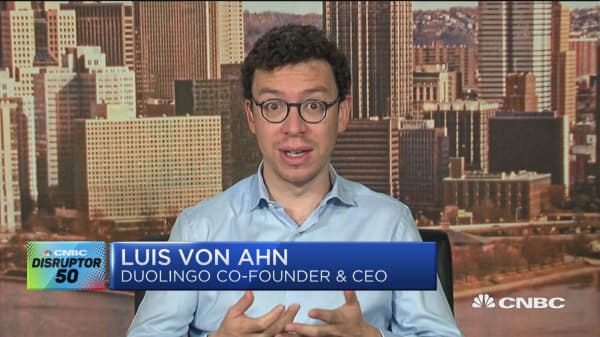Founders: Luis von Ahn (CEO) and Severin Hacker
Launched: 2011
Headquarters: Pittsburgh
Funding: $108.3 million
Valuation: $700 Million (PitchBook)
Key technologies: Artificial intelligence, machine learning
Disrupting: e-learning, language learning
For years Duolingo has been a free and popular language-learning app, but only recently has it started to turn that into a sustainable business by finding an effective way to make money. In 2017 the company claims revenue grew by 1,300 percent to $13 million through a mix of ads, in-app purchases and subscription features. This year Duolingo projects that revenue will reach between $30 million and $40 million.
Read More: FULL LIST: 2018 DISRUPTOR 50
The Pitttsburgh-based company was started by Luis von Ahn and Severin Hacker. The former is a professor at Carnegie Mellon University, and the inventor of CAPTCHAs. The latter received a BS in computer science from ETH Zurich in 2006 and a Ph.D. from Carnegie Mellon University in 2014. Together they started Duolingo, because they realized learning a new language is often difficult and expensive. Duolingo has more than 200 million users worldwide learning any one of the 70 courses it offers, including character-based languages, such as Japanese, Korean and Mandarin Chinese. Users can set a goal for themselves (casual learner or serious) and how much time they're willing to dedicate each day to the lessons.
Duolingo has partnered with top universities and institutions for acceptance of the Duolingo English Test (DET), a fairly significant achievement. The DET disrupts traditional language certification exams, such as the TOEFL, by offering a test that's less expensive ($49 vs. $250) and can be done on a computer in 30 to 45 minutes rather than in person at a testing center. More than 270 universities and institutions now accept the DET (up from 30 this time last year), including Yale, NYU, UCLA, Northeastern and Notre Dame.
In July the company raised $25 million from Drive Capital, bringing its total funding to $108 million. It's valued at $700 million.



























































